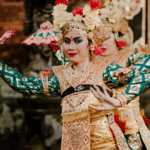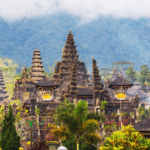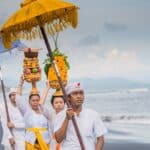The Subak Water Irrigation System Bali is a traditional and sustainable water management system that has been used to irrigate rice paddies on the island for over 1,000 years. It is a complex system that involves a variety of stakeholders, including farmers, water priests, and village elders.
About The Subak Water Irrigation System Bali
The Subak system is based on the principle of Tri Hita Karana, which is a Balinese Hindu philosophy that emphasizes harmony between humans, nature, and the gods. The Subak system is designed to ensure that all farmers have fair access to water, and that the water resources are used sustainably.
The Subak system is divided into a number of different levels, each with its own specific responsibilities. At the village level, there is a subak association that is responsible for managing the water resources for the entire village. The subak association is made up of representatives from each of the subak groups in the village.
Each subak group is responsible for managing the water resources for a specific area of rice paddies. The subak group is made up of all of the farmers who own rice paddies in that area.
The Subak system is also overseen by a water priest, who is responsible for ensuring that the water is used in accordance with Hindu religious principles. The water priest also plays an important role in resolving any disputes that may arise between farmers.
The Subak system is a marvel of engineering and social organization. It is a complex system that has allowed the Balinese to cultivate rice in a sustainable manner for over 1,000 years. The Subak system is also an important part of Balinese culture and identity, and it was inscribed on the UNESCO World Heritage List in 2012.
Here are some of the benefits of the Subak Water Irrigation System:
- It ensures that all farmers have fair access to water.
- It helps to promote sustainable water management practices.
- It is a key part of Balinese culture and identity.
- It has helped to make Bali one of the most productive rice-growing regions in the world.
If you are a traveler interested in learning more about the Subak Water Irrigation System, there are a number of different ways to do so. You can visit a subak temple, which is a Hindu temple that is dedicated to the subak system. You can also take a guided tour of a subak rice terrace.
FAQ about the Subak Water Irrigation System Bali
Q: What is the subak system?
A: The subak system is a traditional Balinese irrigation system that manages the distribution of water to rice paddies. It is a complex system that involves a variety of stakeholders, including farmers, water priests, and village elders.
Q: How does the subak system work?
A: The subak system is divided into a number of different levels, each with its own specific responsibilities. At the village level, there is a subak association that is responsible for managing the water resources for the entire village. The subak association is made up of representatives from each of the subak groups in the village.
Each subak group is responsible for managing the water resources for a specific area of rice paddies. The subak group is made up of all of the farmers who own rice paddies in that area.
The subak system is also overseen by a water priest, who is responsible for ensuring that the water is used in accordance with Hindu religious principles. The water priest also plays an important role in resolving any disputes that may arise between farmers.
Q: What are the benefits of the subak system?
A: The subak system has a number of benefits, including:
- It ensures that all farmers have fair access to water.
- It helps to promote sustainable water management practices.
- It is a key part of Balinese culture and identity.
Q: Can I visit a subak rice terrace?
A: Yes, there are a number of subak rice terraces that are open to visitors. You can either take a guided tour or visit on your own. If you are visiting on your own, be sure to respect the farmers and their property.
Q: What should I wear to a subak rice terrace?
A: It is recommended to wear comfortable shoes and clothing that covers your shoulders and knees. You may also want to bring a hat and sunscreen.
I hope this information is helpful. Have a wonderful trip to Bali!











